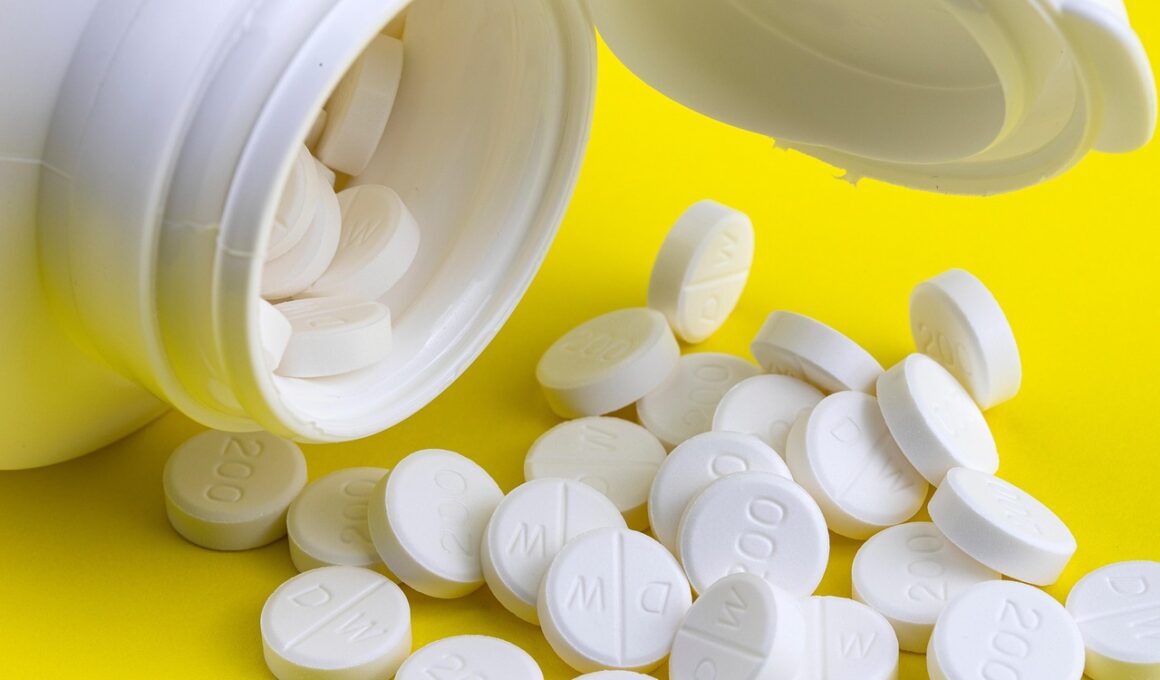Common Vitamin Deficiencies That Can Affect Dog Recovery
Vitamin deficiencies can significantly hinder a dog’s recovery, especially after surgery or illness. One notable deficiency is Vitamin A, crucial for maintaining a healthy immune system and ensuring proper cellular function. Dogs lacking in Vitamin A may show reduced healing capabilities, which can prolong recovery time. The best sources of Vitamin A for dogs include liver, fish oils, and some leafy greens. Additionally, Vitamin B complex is essential for energy metabolism, nerve function, and overall health. Deficiencies in these vitamins can lead to an increase in fatigue and an overall decreased ability to recover efficiently. Omega-3 fatty acids, found in fish oil, can also significantly impact recovery by reducing inflammation and promoting skin healing. Vitamin D is another critical component as it helps with calcium absorption, which is necessary for bone healing. Likewise, Vitamin E acts as a powerful antioxidant that supports cellular repair. Ensuring your dog receives a balanced diet rich in these vitamins is fundamental. Always consult with a veterinarian to identify specific needs and supplementation methods tailored for your dog’s recovery process.
The Role of Vitamin A
Vitamin A deficiency in dogs can be a subtle yet serious issue impacting recovery. This vitamin is crucial for various bodily functions, including vision, immune response, and cell growth. Without sufficient Vitamin A, dogs may experience a compromised immune system, making it harder for them to fight off infections that could hinder recovery. Symptoms of Vitamin A deficiency often include lethargy and dry, flaky skin, which can complicate healing. To combat this deficiency, pet owners should focus on incorporating foods like liver, egg yolks, and carrots into their dog’s diet. If your dog is recovering from surgery, ensuring they have adequate Vitamin A can facilitate quicker healing and better overall health. Supplements are also available, but it’s recommended to consult a veterinarian before introducing any new supplements. Moreover, it is essential to strike a balance, as excessive Vitamin A can cause toxicity. Thus, understanding your dog’s dietary requirements and monitoring their health can lead to faster recovery when dealing with this critical vitamin. In addition, always observe your dog’s symptoms and overall mood during recovery to tailor their dietary needs appropriately.
Understanding Vitamin B Complex
Vitamin B complex plays a vital role in a dog’s recovery process, influencing various aspects of health. This group of vitamins, including B1, B2, B3, B6, and B12, is essential for converting food into energy and supporting nerve function. Deficiencies in these vitamins can drastically reduce a dog’s energy levels and overall vitality, which can prolong recovery timelines. For instance, Vitamin B12 is necessary for red blood cell production, and its lack can lead to anemia, further complicating recovery. Foods rich in Vitamin B include meats, fish, eggs, and some dairy products. If your dog is vegetarian, consider adding beans and lentils as alternate sources. In supplement form, B vitamins can also be beneficial when prescribed by a veterinarian. Additionally, these vitamins aid in maintaining a healthy appetite, which is crucial for recovery. Therefore, ensuring an adequate supply of B vitamins can greatly affect how quickly a dog regains strength and energy. Monitoring their diet and consulting a veterinarian for potential dietary adjustments can help enhance recovery during critical healing phases.
Omega-3 Fatty Acids and Their Impact
Omega-3 fatty acids are invaluable during a dog’s recovery, as they provide numerous health benefits, particularly in reducing inflammation. Inflammatory responses can impede healing and cause discomfort, meaning Omega-3s, predominantly found in fish oil, should be included in a dog’s diet. These fatty acids help to support joint health and mobility, which is particularly important for dogs recovering from surgeries or injuries that involve the musculoskeletal system. To increase Omega-3 intake, consider incorporating fish or flaxseed oil as a supplement or through diet. It’s crucial to ensure the right balance of Omega-3 and Omega-6 fatty acids for optimal health; therefore, consult a vet for proper dosing. Besides reducing inflammation, Omega-3 fatty acids may also enhance brain function and mood, contributing positively to a dog’s overall attitude during recovery. If your furry friend shows signs of discomfort or reduced activity, Omega-3s could play a critical role in their rehabilitation. Regular monitoring and adjustments based on the dog’s needs will support a hassle-free return to energetic activity levels.
Importance of Vitamin D
Vitamin D serves vital functions in a dog’s recovery, especially in promoting calcium absorption, essential for healthy bones. Without adequate Vitamin D, dogs may face challenges in healing fractures or recovering from orthopedic surgeries, as low calcium can hinder bone strength. Natural sunlight is one of the best sources of Vitamin D, as it enables dogs to synthesize this vitamin naturally. However, during winter months or for indoor dogs, dietary intake becomes vital. Foods like fatty fish, fortified egg yolks, and certain mushrooms can provide necessary levels of Vitamin D. Supplements are available but must be given cautiously, under a veterinarian’s guidance, to avoid toxicity. Symptoms of Vitamin D deficiency may include weakness and muscle pain, making it vital to monitor your dog’s recovery closely. Furthermore, establishing a balanced diet focused on adequate Vitamin D can aid not just in healing but also in the general well-being of your dog. It’s imperative to consult your veterinarian for the best dietary approach tailored to your dog’s specific condition and recovery needs.
Vitamin E as an Essential Antioxidant
Vitamin E acts as a potent antioxidant, critical in promoting cellular repair during a dog’s recovery. This vitamin protects cells from oxidative damage and inflammation, which is particularly relevant post-surgery or after an illness. Dogs that are deficient in Vitamin E may experience slower healing processes, reduced immunity, and weakness, complicating their recovery. Naturally, Vitamin E can be found in various foods, including spinach, nuts, and seeds, making it essential to introduce these into your dog’s diet. In some instances, supplementation may be necessary if dietary sources are inadequate. However, it’s essential to consult your veterinarian regarding appropriate doses to prevent overdose. Furthermore, ensuring that your dog receives the right amount of Vitamin E can significantly enhance their ability to recover. Monitoring the overall health of your dog during recovery hasn’t been simpler, with nutritional adjustments playing a key role in their ongoing well-being. Regular vet visits can further guide necessary changes in diet and the introduction of supplements to aid recovery.
Consulting Your Veterinarian
Ensuring a balanced intake of the essential vitamins during your dog’s recovery is crucial, and seeking guidance from a veterinarian is invaluable. A veterinarian can assess your pet’s nutritional needs based on health conditions or recovery status. They often recommend specific dietary sources or supplements that provide the necessary vitamins tailored to your dog’s situation. Evaluating blood work may reveal specific deficiencies, allowing for targeted supplementation that can accelerate your dog’s recovery. Through regular check-ups, veterinarians can monitor your dog’s progression to provide tailored advice on adjusting dietary intake as recovery evolves. A pet owner’s proactive approach in observing changes and discussing concerns with their vet enhances the effectiveness of the recovery plan. Each dog is unique, and their dietary requirements may vary, necessitating personal evaluation and adjustments to achieve optimal health. Therefore, developing a strong relationship with your veterinarian ensures that your dog not only recovers faster but thrives well beyond their recovery period. Adhering to vest advice alleviates unnecessary complications, ensuring your buddy stays healthy and vibrant.
In summary, vitamin deficiencies can significantly impact a dog’s recovery and rehabilitation. Essential vitamins such as A, B complex, D, E, and Omega-3 fatty acids prepare the body for healing. Understanding each vitamin’s role aids in selecting a balanced diet that supports recovery. Moreover, consulting with a veterinarian can help tailor the dietary needs of your dog for optimal health at every stage of recovery. Observing interest and changes in your dog’s behavior post-surgery or illness is crucial. Recognizing potential deficiencies early will enable you to provide timely supplements and dietary adjustments. Each dog’s dietary needs may vary, making personalized care significant. Remember, adequate nutrition lays the foundation for quicker recovery times and better overall health. By providing the essential vitamins that prevent deficiencies, you contribute to your dog’s happiness and well-being. Taking an active role in your dog’s dietary management not only fosters recovery but also encourages lasting vitality throughout their lives. Be attentive to their needs and maintain a steady dialogue with your veterinarian for the best outcomes. The journey towards recovery can be smooth with the right information and teamwork.


